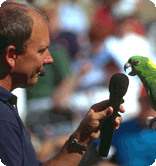Allopreening

My Question: My male military macaw is becoming sexually mature. One odd behavior I’ve noticed is that when I am allopreening him, (I try to avoid any deliberate arousal), he now opens his beak and works his tongue in a very specific way, which he never did in the past.
I know that the flehmen response is specific to some mammals, (although many more animals, including snakes, use the vomeronasal organ to locate mates). This is the closest thing I can think of in terms of behavior.
I saw an intriguing reference to male mallards’ changing their reproductive behavior when their olfactory nerves were sectioned, but I’ve never read anything that specifically relates to the behavior I’m seeing.
Any thoughts about this? I never see him doing it when he isn’t in more or less direct contact with me, but he isn’t touching me with his beak or anything.
Thanks,
Nancy Sullivan

Hello Nancy! My name is Chris Jenkins, and I am one of the Supervisors with Natural Encounters, Inc. Steve forwarded me your question about your Military macaw, and we’d be happy to offer our thoughts.
When parrots in the wild are in the process of allopreening, there are often a number of other behaviors that seem to occur at the same time. These are sometimes referred to as “comfort behaviors”, and include things like scratching, yawning, and stretching. Companion parrots often exhibit the same sorts of behaviors when they are being preened by their owners, and from what you’ve described our best guess is that what you’re seeing is yawning. It doesn’t sound like what your seeing is reproductively related, and it is possible that while the behavior was originally triggered by the stimulation of the preening itself, the “yawning” behavior may now be displayed more frequently either because the behavior itself is pleasurable for the bird, or because there is reinforcing value in whatever reaction he gets from you when the behavior is displayed. In speaking with Steve, he mentioned that he has most often seen this sort of behavior when a bird is scratched near the ears, so we’d be curious to know if the behavior is most noticeable when the preening occurs in this area.
Hope this information is helpful!
Chris Jenkins
Supervisor
Natural Encounters, Inc.

































